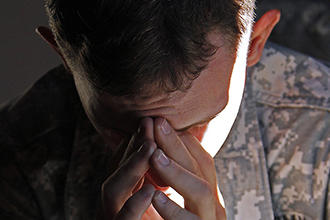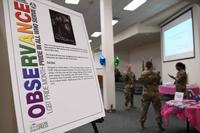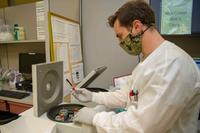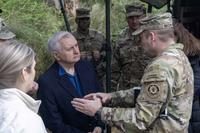WASHINGTON -- This month is Suicide Prevention Month, and Defense Secretary Chuck Hagel has said preventing military suicides is one of the Defense Department's highest priorities.
"As we observe Suicide Prevention Month," Hagel said in a message to the department's workforce, "we must rededicate ourselves to actively working not only every month, but every day to fulfill our collective responsibility to watch out for each other and take care of each other."
This is the third article in a four-part series about a Navy petty officer who came close to taking his own life but did not do so, thanks to the intervention of his leadership and the use of support networks, and how he continues to brave his battle with alcoholism and depression.
Due to emotional and physical abuse as a child, Navy Petty Officer 1st Class Jason Thompsoan, an instructor at a joint command in Maryland., grew up with suicidal ideations and attempted suicide as early as age 9. He joined the Navy in 1998 and became a mass communication specialist. He said he battled with his depression throughout his Navy career.
After not getting promoted and having a bad break-up in 2012, Thompson began showing up late for work regularly and missed a duty day. His supervisor and other Navy chiefs on staff said he usually was a superior performer and they knew something was wrong, so they held a professional development board, or intervention. During this session, Thompson broke down and admitted he was suicidal. He was taken to Walter Reed National Military Medical Center in Bethesda, Maryland.
Mental Health
Two of the chiefs from the intervention gave Thompson a ride to Walter Reed, and he said he filled out his own check-in form for inpatient mental health care on the seventh floor.
"At that point, I was relieved, because there was no reason to lie to myself or anybody else anymore," Thompson said.
After he checked in, he was searched, received his hospital pajamas and met with his nurse-and-physician team to discuss the problem that brought him in.
Each patient is addressed individually and receives his or her own treatment plan, and sometimes medication, said Army Lt. Col. (Dr.) Bryan Bacon, chief of inpatient psychiatry at Walter Reed National Military Medical Center.
"We take people who are having significant mental health problems and provide a safe place for them to get balanced again, so they can go back out for outpatient treatment," he said. "We help them to remember that life is worth living. We start to address some of the core problems or beliefs that have been bothering them or irritating them or bringing them down. And we start connecting thoughts and feelings together so that behaviors can change."
The treatment plans include group and one-on-one therapy, Bacon said. Thompson said when he sat down in his first group therapy session, he wasn't ready to listen to other people's stories.
"I was still hurting and wanted to focus on me. They're not the ones living my life," he said. "But what I took away from that was not the individual stories of those who had also tried and failed to kill themselves. What I took away from that was that there's a measure of honesty above and beyond that, once reached, breaks down all manner of barriers, that sort of emotional fearlessness. I realized I was surrounded by a group of survivors. Not only could life not kill these people, but they couldn't kill themselves. Anything else after that is a glorious day, and we found strength together."
One-On-One Therapy
He said his next step was one-on-one therapy sessions tailor-made for him.
"They were agonizing, punishing, stab-ripping," he said. "After the second one, I spent the next day in my room crying the whole day. I couldn't stop; it was compulsive. The dam had finally broken. My therapist waited two days before we met again, but then it just got easier and easier to discuss with unabashed honesty what was really bugging me, why I do the things I do and what happened to me.
"I haven't had a suicidal ideation in almost two years, and it doesn't occur to me anymore," Thompson continued with a smile that lit up his face. "It used to be an ace in the hole. The idea of ending my own life wasn't just an idea; it was a viable option. My thinking started turning around when I found myself in a mental health facility in Bethesda."
After a month at Walter Reed, Thompson went to Cedar Hills Hospital in Portland, Oregon, a dual-treatment facility for post-traumatic stress and substance abuse, for treatment for his PTSD from childhood trauma and his alcohol abuse. He said after the month of treatment there, he got his sense of humor back.
"In addition to the wonderful therapy, I was able to grow a really nice beard," he said with a quick smile. "I found that, at least for me, if I can make fun of my problems, they lose their teeth. And they can't bite me anymore. I like who I am now. I appreciate who I am now; I never did that before. I can be honest with those around me."
Thompson said asking for help and admitting his suicidal ideations didn't negatively affect his career.
"When I admitted help, I wasn't thinking about my career. I just wanted to live," he said. "But there have been no negative effects on my military career at all. I volunteered for treatment, self-referred, and I got all the help I needed. I haven't seen an adverse note on any evaluation since then. I haven't been formally counseled about having a suicidal ideation. There have been no negative repercussions of my efforts to kill myself at all. If fact, quite the opposite -- they've been nothing but supportive."
Chaplains
If someone in pain doesn't want to seek mental health services, he or she can seek confidential support through installation chaplains. The chaplain's primary mission is a ministry of presence, said Army Chaplain (Maj.) James Covey, family life chaplain at Fort George G. Meade, Maryland.
"It's the presence of someone who cares that matters most, someone being present with someone who's hurting," he said. "If someone is recovering from a crisis or struggle, they need people in their lives they can come to and that they can trust. And so practicing that ministry of presence, chaplains are embedded at the battalion level on up in the military so we try to be there with the soldiers in the workplace, in the field, on the battlegrounds, in the cubicles, in the offices, building relationships. Our mission is people.
"If someone does seek help at Walter Reed," he continued, "their first day back on the job, the chaplain will be present with them at the work site, just confirming the service member has all of our points of contact and that they wouldn't have to look far to find me. I'll always be available to you."
While Thompson didn't directly use chaplain-specific support, when he came out of Cedar Hills, he reconnected with his surrogate father and childhood mentor, Barry Davis, a former Army chaplain and McDowell High School history teacher in Erie, Pennsylvania. Thompson met him when he moved to Erie when he was 14 years old and began high school there.
Thompson was active in the Air Force Junior ROTC program, and Davis was best friends with the senior aerospace science instructor, retired Air Force Col. Charles Marriott. Thompson developed a friendship with both Davis and Marriott that continues to this day.
"I lost two twin boys at birth, and Jason became the surrogate son I never had," Davis said. "He's provided a lot of support to me, and I take pride in what he does. I carry a picture of him so he's constantly with me. He became very much a part of my family. I knew there were some difficulties with his family but he hid it very well.
"I thank God for the Navy," he said. "It saved his life. I don't think he'd be around today. When he asked for help, the Navy was there. And without that, I have no doubt that we wouldn't be talking about him today. They saved his life, and I'm very thankful to God that they were there. When he called me from the hospital, the first thing I said to him was, 'I'm very proud of you, that you took this step, and I love you. I will always love you, and I will be here for you when you get out. And we will go on.' And we both cried."
A Very Hard Day
That was a very hard day, Davis said, adding that his daughter, Lacy, said, "I just can't take the thought of Jason being gone."
"If Jason had died," Davis said, "it would've been like losing my sons again. I love Jason Thompson -- I tell him that now all the time. I love that he calls me Pops. I'm extremely proud of him."
The colonel said Air Force Junior ROTC was like a family for Thompson, and after teaching hundreds of students for more than 22 years, he has only two photos of students behind his desk. One of them is of Thompson.
"Jason was probably the smartest kid I've ever had in ROTC," said Marriott, a former special operations C-141 pilot in Vietnam. "As a young man, you could see he was hiding some problems, but when he was with us, he was open, happy, patting everybody on the back, a big team player, a leader. He was a vital part of our program.
"I spent a lot of time with him, talking with him, working with him, listening to him," Marriott continued. "It was fun to watch him grow. He cares about other people, and if he can save one other person, he'll do anything he can to help that person. He was one of the best cadets I ever had. I have a picture of him behind my desk, because I always knew he was going to grow up to be successful. I'm still waiting for his best-selling novel."
Support Groups, Peer Support
Davis and Marriott are just two of the many peers who support Thompson in his recovery.
"I got phone calls from every continent except Antarctica when I was in the hospital," Thompson joked. "People I hadn't spoken to in maybe five years called me, wrote me letters. Friends of friends wrote me letters. They rallied around me. I really understood the impact my life has had on those around me, how I affect those around me, how significant that is. I realized how thin and frail the lines are that connect my existence with others and how close I was to severing those lines. I have an extraordinary set of friends."
When he came back to work, Thompson's supervisor said, he wanted to hit the ground running, but he made him start with baby steps. She said she didn't know what she would have done if he had taken his life.
"I've known him for 10 years; my children know him. If he had actually gone that night and done what he later said he was thinking about doing, I can't imagine my life without him," said Navy Senior Chief Petty Officer Misty Hubbard, the Navy element senior enlisted advisor at a joint command in Maryland and Thompson's supervisor. "Had he robbed us of having him in our lives, I don't know if I would've forgiven him. So many people care about him and enjoy his company. The students he teaches here, the lives he impacts every single day, you can't really put into perspective the impact he has on people's lives."
Thompson now is "a million times better," Hubbard said.
"He's got to go to his counseling and his meetings regularly, but he's getting better," she added. "He's not fixed. He's not cured. You're not going to undo 30-plus years of emotional and psychological trauma in two months. You're just not. But he's better than he was. And he's alive, so I'm happy with that."
Crediting Supporters
Thompson credits his peers, supervisors, mentors and support groups with his positive recovery efforts.
"I'm closer with my [Alcoholics Anonymous] sponsor than I ever was with my mother," he said with a laugh. "The recovery steps help put together the pieces of a life that was very close to being destroyed. My sponsor is incredibly close to me, and my chain of command is nothing short of remarkable. I can reach out to anybody at any time with no fear, with no stigma, with no worry about perception. In fact, I've been praised for my honesty about how I feel because I've found that the more often I tell my story, it gives others permission to share as well."
Thompson encourages anyone who feels they need help to use the many Defense Department and civilian resources available.
"There are so many outlets and people who are trained to not talk at you but listen to you, chaplains, fleet and family support center members, counselors, military therapists, civilian therapists, even your best friend, the ones who are willing to tell you the things you need to hear, not the things you want to hear, the ones who will delay judgment. Those are the ones you need to surround yourself with," Thompson said. "You never have to walk alone, and I learned that. In this uniform, in this service, you never have to walk alone."
Davis said he hopes the Suicide Awareness Month observance helps people know that help is out there, and that Jason Thompson is an example that they can get the same help if they want it.
This is part three of a four part series.
- Navy Petty Officer Considers Suicide
- Intervention Saves Suicidal Navy Petty Officer
- Navy Officer Overcomes Suicidal Thoughts with Mental Health Care
- Navy Officer Works Past Depression to Live Fulfilling Life
If you need help, if you know someone who is, or even if you just need someone to talk to, contact the Military Crisis Line via phone, online chat or text message. Just call 1-800-273-8255 and press 1; visit www.militarycrisisline.net; or text 838255. It's free, easy and confidential, and trained professionals are there for you 24 hours a day, 365 days a year. For service members and their family members needing support, call Vets 4 Warriors, a 24/7 confidential peer-to-peer support help line run by veterans at 1-855-838-8255 or visit www.Vets4Warriors.com. For family members of service members who have lost their lives to suicide, call Tragedy Assistance Program for Survivors, a 24/7 tragedy assistance resource, at 1-800-959-8277.










